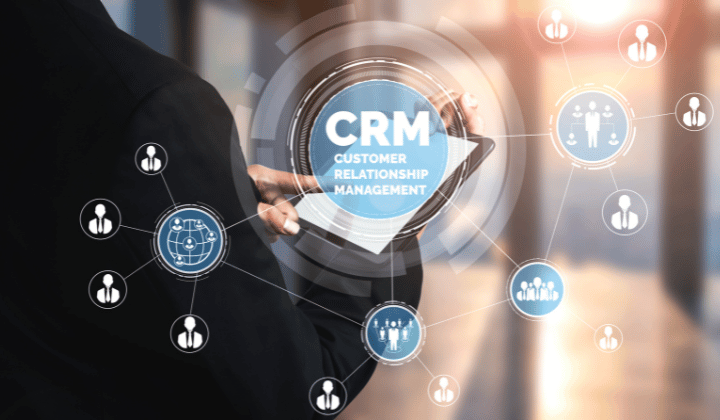Small businesses are constantly looking for ways to increase sales and build customer loyalty, and a powerful tool that can help achieve these goals is Customer Relationship Management (CRM) software.
With small business CRM, companies can streamline their sales and marketing processes, enhance customer service, and improve overall profitability.
CRM software provides a centralized platform where businesses can effectively manage their customer interactions.
By integrating sales, marketing, and customer service functions, CRM allows companies to gain valuable insights into customer preferences and behavior. This data can be used to personalize marketing campaigns, target specific customer segments, and cultivate relationships.
Additionally, small business CRM facilitates better lead management, allowing businesses to track and prioritize leads, automate follow-ups, and improve conversion rates. This not only saves time but also ensures that no potential sales opportunities are missed.
By providing exceptional customer experiences, small businesses can stand out from their competitors and create brand advocates who are more likely to make repeat purchases and recommend the company to others.
The importance of CRM for small businesses
CRM is no longer just a tool for large corporations. Small businesses can also benefit greatly from implementing CRM software.
In fact, it has become essential for small businesses to leverage CRM to compete in today’s market.
According to research, companies that effectively use CRM can increase their sales by up to 29%. This statistic highlights the importance of CRM for small businesses in driving revenue growth.
CRM software allows small businesses to consolidate customer information in one place, making data management and analysis easier.
This valuable data can be used to identify trends, preferences and purchasing behaviors, allowing companies to tailor their marketing efforts to specific customer segments.
By understanding customer needs, small businesses can develop personalized marketing campaigns that resonate with their target audience.
Additionally, CRM for small businesses allows them to provide exceptional customer service. With access to a customer’s history, preferences, and past interactions, companies can offer personalized support, promptly resolve issues, and exceed customer expectations.
This level of personalized service builds trust and loyalty, leading to repeat business and positive word-of-mouth recommendations.
By implementing CRM software, small businesses can gain a competitive advantage, increase sales, and build long-term customer relationships.
CRM statistics and success stories
To further emphasize the importance of CRM for small businesses, let’s explore some compelling statistics and success stories:
1. Improvement in Sales Productivity:
On average, CRM software increases sales productivity by 34%. This improvement is due to streamlined processes, better lead management, and enhanced collaboration among sales teams.
2. Enhanced Customer Experience:
According to research, businesses that prioritize customer experience generate 60% higher profits than their competitors. CRM software plays a crucial role in delivering exceptional customer experiences by providing insights into customer preferences and enabling personalized communication.
3. Increased Customer Retention:
Small businesses that effectively implement CRM software see a significant improvement in customer retention rates. By nurturing relationships, providing timely support, and delivering personalized experiences, businesses can create loyal customers who are more likely to continue doing business with them.
4. Improved Marketing ROI:
CRM software allows small businesses to track the success of their marketing campaigns and measure the return on investment (ROI). By analyzing data and identifying which campaigns are most effective, businesses can allocate their marketing budgets more efficiently, resulting in higher ROI.
One success story worth mentioning is that of a small e-commerce business that implemented CRM software.

Success Story with CRM
By leveraging CRM, the business was able to segment customers based on their buying behavior and preferences. This allowed them to send personalized product recommendations and targeted promotions, leading to a significant increase in conversion rates and sales.
The business also saw an improvement in customer satisfaction and loyalty, as customers appreciated the tailored shopping experience.
These statistics and success stories highlight the tangible benefits of CRM for small businesses. By investing in CRM software, small businesses can achieve remarkable results and drive growth.
Choosing the right CRM software for your small business
When it comes to choosing CRM software for your small business, it’s important to consider several factors. Here are some key considerations to help you make an informed decision:
- 1. Business Needs and Goals: Before selecting CRM software, clearly define your business needs and goals. Determine what features and functionalities are essential for your business to achieve its objectives. For example, if you prioritize lead management and sales automation, look for CRM software that excels in these areas.
- 2. User-Friendliness: CRM software should be easy to use and navigate. It should have an intuitive interface that allows your team to quickly adapt and maximize productivity. Consider the learning curve and training requirements for your employees when evaluating different CRM options.
- 3. Customization and Scalability: Look for CRM software that can be customized to fit your business processes and workflows. It should be flexible enough to adapt to your changing needs as your business grows. Scalability is crucial to ensure that the CRM software can accommodate your expanding customer base and increasing data volume.
- 4. Integration Capabilities: Consider the CRM software’s integration capabilities with other business systems and applications you currently use. Seamless integration with your existing tools, such as email marketing software or customer support systems, can streamline operations and improve efficiency.
- 5. Data Security and Privacy: Ensure that the CRM software you choose has robust security measures in place to protect your customer data. Look for features like data encryption, user access controls, and regular backups. Compliance with data privacy regulations, such as GDPR or CCPA, is also important.
- 6. Customer Support and Training: Evaluate the level of customer support and training provided by the CRM software vendor. Check if they offer comprehensive documentation, video tutorials, and responsive customer support channels. A reliable support system is crucial to ensure smooth implementation and ongoing assistance.
By considering these factors, you can select a CRM software that aligns with your business needs and maximizes its potential.
Benefits of CRM for boosting sales
CRM software offers several benefits for small businesses when it comes to boosting sales. Let’s explore some of these benefits:
1. Streamlined Sales Processes:
CRM software centralizes customer information, sales pipelines, and communication history, making it easier for sales teams to manage and track their activities. This streamlining of processes saves time and allows sales reps to focus on selling, resulting in increased productivity.
2. Improved Lead Management:
CRM software enables businesses to track and prioritize leads effectively. By assigning scores or statuses to leads based on their potential, sales teams can focus their efforts on high-value opportunities. Automated lead nurturing workflows ensure that leads are followed up with timely and relevant communication, increasing the chances of conversion.
3. Better Sales Forecasting:
With CRM software, businesses can generate accurate sales forecasts based on historical data and current sales trends. This forecasting helps businesses make informed decisions, allocate resources effectively, and set realistic sales targets. Improved sales forecasting leads to better planning and increased sales performance.
4. Enhanced Cross-Selling and Upselling:
CRM software provides insights into customer preferences, purchase history, and buying patterns. Armed with this information, businesses can identify cross-selling and upselling opportunities. By recommending relevant products or services to customers, businesses can increase their average order value and drive additional revenue.
5. Improved Sales Collaboration:
CRM software enables seamless collaboration among sales teams. Sales reps can easily share information, update customer records, and collaborate on deals. This collaboration fosters a team spirit, enhances knowledge sharing, and ultimately leads to better sales outcomes.
By leveraging CRM software, small businesses can improve their sales processes, increase lead conversion rates, and maximize revenue generation.
Benefits of CRM for building customer loyalty

Building customer loyalty is crucial for small businesses, and CRM software plays a significant role in achieving this. Let’s explore some of the benefits of CRM for building customer loyalty:
- 1. Personalized Communication: CRM software allows businesses to personalize their communication with customers. By leveraging customer data, businesses can send targeted and relevant messages, offers, and recommendations. Personalized communication makes customers feel valued, understood, and appreciated, fostering loyalty.
- 2. Timely Support: With CRM software, businesses can provide timely and efficient support to customers. Access to customer history, previous interactions, and preferences enables businesses to resolve issues quickly and effectively. Timely support builds trust and strengthens customer relationships.
- 3. Proactive Customer Engagement: CRM software enables businesses to proactively engage with customers. By setting up automated triggers, businesses can send personalized follow-ups, birthday wishes, or loyalty rewards. Proactive engagement shows customers that they are valued, keeping them engaged and loyal.
- 4. Customer Feedback and Surveys: CRM software allows businesses to gather customer feedback and insights. By conducting surveys and tracking customer satisfaction metrics, businesses can identify areas for improvement and address customer concerns promptly. This feedback loop builds trust and demonstrates a commitment to customer satisfaction.
- 5. Customer Retention Strategies: CRM software helps businesses implement effective customer retention strategies. By segmenting customers based on their behaviors and preferences, businesses can create targeted loyalty programs, exclusive offers, or VIP experiences. These strategies incentivize repeat purchases and foster long-term loyalty.
By leveraging CRM software, small businesses can personalize communication, provide timely support, and implement customer retention strategies that build loyalty and drive repeat business.
CRM best practices for small businesses
To make the most of CRM software, small businesses should follow these best practices:
- 1. Define Clear Goals: Clearly define your goals and objectives for CRM implementation. Ensure that everyone in your organization understands these goals and is aligned with your CRM strategy.
- 2. Train Your Team: Provide comprehensive training to your team on how to use the CRM software effectively. Ensure that they understand the benefits of CRM and how it aligns with their roles and responsibilities.
- 3. Regularly Update and Clean Data: Regularly update and clean your customer data to ensure accuracy and reliability. Remove duplicate or outdated records, and ensure that the data is up to date and relevant.
- 4. Segment Your Customer Base: Segment your customer base based on their behaviors, preferences, or demographics. This segmentation enables personalized communication and targeted marketing efforts.
- 5. Automate Routine Tasks: Leverage automation features in your CRM software to streamline routine tasks. Automate lead nurturing, follow-ups, and other repetitive processes to save time and increase efficiency.
- 6. Monitor and Analyze Key Metrics: Regularly monitor and analyze key metrics related to sales, customer satisfaction, and engagement. This data provides valuable insights into your CRM performance and helps identify areas for improvement.
- 7. Encourage Collaboration: Encourage collaboration among your team members by leveraging the collaboration features of your CRM software. Foster a team spirit and facilitate knowledge sharing for better sales outcomes.
By following these best practices, small businesses can optimize their CRM implementation and maximize its impact on sales, customer loyalty, and overall business success.
CRM integration with other business systems
CRM software is most effective when integrated with other business systems and applications. Here are some key integration possibilities:
1. Email Marketing:
Integrate your CRM software with your email marketing platform to seamlessly synchronize customer data and automate email campaigns. This integration ensures that your marketing efforts are well-coordinated and personalized.
2. E-commerce Platforms:
Integration with e-commerce platforms allows businesses to sync customer data, order history, and purchase behavior. This integration enables personalized product recommendations, targeted promotions, and enhanced cross-selling or upselling.
3. Customer Support Systems:
Integrating your CRM software with customer support systems enables a seamless flow of customer information between sales and support teams. This integration ensures that customer issues are resolved promptly and that support agents have access to relevant customer data.
4. Accounting Software:
Integration with accounting software streamlines the invoicing and payment processes. It enables businesses to track customer payments, manage invoices, and update financial data in real-time.
5. Social Media Platforms:
Integrating CRM software with social media platforms allows businesses to track customer interactions, mentions, and sentiment. This integration provides valuable insights into customer preferences and behaviors on social media.
By integrating CRM software with other business systems, small businesses can streamline operations, improve efficiency, and deliver a seamless customer experience.
The 3 best-known sales-focused CRM platforms on the market

In today’s business world, sales success is closely linked to the effectiveness of customer relationship management (CRM).
Three platforms stand out when it comes to sales-focused CRM: Salesforce Sales Cloud, HubSpot CRM and Zoho CRM.
Each of these platforms offers a variety of features designed to help sales teams maximize their efficiency, manage leads, and close more deals. Check out a brief summary about them:
- Salesforce Sales Cloud: One of the most popular CRM platforms, it offers a variety of features to help sales teams manage leads, opportunities, and contacts effectively. Offers integration with other sales and marketing tools.
Read more about: Salesforce sales cloud
- HubSpot CRM: Offers a complete solution for customer relationship management, including sales automation tools, lead tracking, and custom reports. Its intuitive interface and automation features make it easy to manage your sales pipeline.
- Zoho CRM: A robust platform that offers a wide range of features for sales management, including sales automation, sales forecasting, email marketing, and advanced analytics. It is known for its ease of use and flexibility to customize sales processes.
Conclusion: The future of CRM for small businesses
In the ever-evolving business landscape, CRM is more vital than ever for small businesses.
As we look to the future, agile adaptation and intelligent use of technologies like CRM will be crucial to success.
Investing in flexible and scalable CRM solutions not only increases operational efficiency but also drives growth and customer loyalty.
At OCS, we specialize in Salesforce and organizational cost reduction, offering expertise to help your company implement and maximize results.
Ready to transform your CRM strategy?
Contact us today to explore how we can boost your business.

